A nonbinary, chronically ill, ADHD-having queer in their forties shares their efforts to be a functioning adult: what works, what doesn't, what "helpful advice" makes them want to scream and throw things like a toddler who happens to have gray in their hair.
Don't wanna be here? Send us removal request.
Text
Dudes healthcare is so fake. My ADHD meds are $940 without insurance. But they gave me a website of "coupons" which straight up looks like a scam website, and I got it today for $60! Just a coupon from a random website and it was $900 cheaper. America, I am confusion!! America explain!!
82K notes
·
View notes
Text
My 30-something wisdom is that your palate is constantly changing so don't assume because you hated a food 10 or 20 years ago you still will. Most radically, your taste as a little kid is not indicative of what it will be as an adult-- I've known too many adults who still refuse to eat anything but chicken strips and ketchup because they're still basing their taste on what they experienced at 8 years old and so have cut themselves off from the entire world of adult taste. In my case, my taste for savory foods, especially vegetable dishes, "bitter" foods, and more complex flavor combinations has really expanded. I didn't like mushrooms as a child or for most of my 20s, but around 28 suddenly they worked for me. I started enjoying dark chocolate around 25, especially paired with fruit flavors. I've never been hugely fond of eggplant but discovered that in a sauce or roasted in butter and oil its delicious. I've always enjoyed fish but in the last 15 years I've discovered a passion for it, salmon especially. I've learned to recognize the tastes of herbs and love putting them into everything I can (currently I'm most enthusiastic about dill.) I'm also suddenly crazy about all kinds of sandwiches. And I'm still trying olives every couple years in case suddenly they start working for me, though sadly no luck on that front yet. So basically, expect that your taste is going to change in adulthood and expect that it will keep changing. And you can also work to develop your palate by exposing yourself to new flavors and combinations and cuisines, opening you up to even more foods you might never have liked before. So keep trying new and old foods, because you never know when you might suddenly start liking something new or discover a new way it can be prepared or a new texture it can come in. Don't wind up imprisoned in a world of chicken strips just because you haven't tried anything else since 3rd grade, you deserve better.
4K notes
·
View notes
Text
Hey kid you want a job?
Great get online and go to a job board. Indeed, Linkedin whatever. Now you're gonna search for a role that's in your city, fits your qualifications, and doesn't seem like a bad time.
See that easy apply button? Don't hit it they just throw those in the trash. Now you're gonna want to go to the company's website and check their careers page.
Oh? That job doesn't exist anymore. Cool go back to the job board and find another one.
Great you found another job, you're on the company's career page and the job exists!! So you're going to need to make an account on the career page website. They're using Workday, the same site as the last job you applied for? Who cares? You need to make another account for THIS job's workday page.
Now you're going to upload your resume. That'll autopopulate about 15 boxes with everything on your resume, except formatted wrong and with tons of errors. So just go through and painstakingly check the dates on all of that and rewrite everything you already laid out in an aesthetically pleasing format on your resume.
Ok time for the cover letter, explain why this specific job and company are deeply important to you. You love their mission statement and wouldn't even laugh if their ceo was gunned down in the street. You'll really want to reiterate the things you just spent the last 20 minutes filling out on the resume section
(Remember to include language from the job description, people who work in HR are lower than dogs and they need patterns or they get confused.) Write about a page, but hey don't sound too desperate or robotic this is where they judge your character!
Maybe add your portfolio site at the end here, who knows if that helps no one has ever clicked mine haha.
Anywayyy time to hit apply! Congrats! You'll see that confirmation email come in and you should be getting the rejection letter in about 2 weeks. Unfortunately your resume didn't have the right buzzwords and the AI auto rejected you :(
Time to start again and try not to kill yourself!
54K notes
·
View notes
Text

184K notes
·
View notes
Text
I was talking to my mom the other day, and she said she was going to start going to the gym, because its important care for your body. I’m disabled w/ multiple chronic illnesses, so going to the gym is impossible for me. She seemed to realize this, and started to backtrack, saying like - its part of taking care of herself, and I interrupted and said, “Its okay mom. You and I taking care of ourselves look very different”. And thats what I would like you to know.
Taking care of yourself looks different.
For some people, taking care of themselves looks like fruit smoothies and gym visits, cutting out sugar and weight training.
For some people, taking care of themselves looks like hospital visits, feeding tubes and ports. Needles and tests.
For some people, taking care of themselves looks like taking medication and lying down in a cool dark room.
For some people, taking care of themselves looks like getting any calories in their body that they can.
For some people, taking care of themselves looks like adding in more vegetables and trying to go outside to get sun more often.
For some people, taking care of themselves looks like seeing a therapist, keeping symptom journals, and practicing mindfulness, meds, or grounding techniques.
We all have different needs. Please don’t feel bad about how you care for yourself just because someone else is able to do “more”, or their care is more performative or obvious. Please don’t look down on someone for caring for themselves in a way that you do not. Medication and rest are just as important as exercise and vegetables.
Keep doing your best to care for yourself, the best way you know how. Your self care and health is important, no matter what it looks like.
68K notes
·
View notes
Text
hate when people are like "trust your gut! listen to your intuition!" like okay well my gut is telling me every person i lay eyes on is hunting me for sport and my intuition is saying i should find a secluded cave and live there forever so what do you suggest i do with that information
111K notes
·
View notes
Text
things that made me stop wanting to die that require no effort whatsoever
change the color used to highlight text on your laptop
move the pictures on your wall
stack whatever clutter is in your room into piles even if you don’t have time to clean it all
slightly vary your commute, even just by one street
change where you sit and scroll aimlessly on your phone even if it’s only to the chair in your room instead of your bed
drink water or juice out of a wine glass in the morning because nothing is real
shower with the lights off, without music
buy $3 flowers at trader joe’s—they look bad next to the more expensive ones but they look so good in your room
start typing things you don’t post into your notes. your thoughts can be worth documenting even if you don’t deem them worth sharing
wake up super early just once. you don’t have to make it a habit it’s just extra satisfying to go to bed that night
listen to the entirety of your favorite album from 2015
376K notes
·
View notes
Text
Hey you know what sucks is predatory companies that make you enter your email address so that they can harass and advertise to you to access resources you might need to keep track of expenses after a disaster. So, uh, fuck them.
If you need to track the cost of things like hotel stays, pet kenneling, medical care, etc. after a disaster you can use this worksheet.
If you need to create an inventory of your home for an insurance claim (and if you'd like to do this to keep someplace safe before a disaster) you can use this worksheet (two pages, instructions on the first page, worksheet on the second).
And here's a FEMA document with numbers for disaster relief groups and a checklist of documents that you may need to have replaced as well as a description of what to do if you had cash in your home that was destroyed and can possibly be replaced.
32K notes
·
View notes
Text
your life is not an optimization problem
67K notes
·
View notes
Text
i know vitamin c basically neutralizes adhd meds but lemonade good
239K notes
·
View notes
Text
Do not quit alcohol cold turkey
Do not suddenly stop drinking alcohol as a new years resolution if you have been consistently using alcohol most days
Your body gets used to the presence of the alcohol as a sedative in your system
Suddenly removing the sedative you are chemically accustomed to is like suddenly removing the wall you are leaning on - you will topple over
You brain electricity gets overexcited
This causes seizures
This causes sudden onset dementia (Wernicke's encephalopathy)
This causes brain damage
If you use alcohol often (even in moderate amounts)
Or in large amounts
Or you have ever noticed you get shakey tremors and anxious when you stop drinking
Then your body is chemically dependant and you need to be very careful coming off alcohol otherwise you will cause brain damage
Slowly wean down the amount you drink over days or weeks
Talk to a doctor about your goals to quit and ask about support options
Medically supported withdrawal is a lot safer
If alcohol withdrawal goes badly there is a 15% chance it will kill you.
Do not go this alone
You deserve to be safe
16K notes
·
View notes
Text
If you’ve never been all that disobedient before, you can and should start really, really small. For example, you can wear the slightly revealing or gloriously trashy-looking garment that makes your mom roll her eyes and sigh despondently every time she sees you put it on. You will feel judged and disapproved of when you put it on, but that is fine. Your goal is to sit with the uncomfortable feelings and continue with your desired behavior anyway. Saunter down the steps in that highlighter-yellow Garfield crop top with your chest hair flowing over the neckline, and harness as much courage as you can muster. It’s okay if you feel like a beacon of sin. Just keep it moving. Your emotions are not the target here. Your behavior is. You can feel however you are feeling in the moment so long as you keep acting like you’re free. Do you have a favorite TV show that a partner or roommate vocally hates? Try watching that show around them without apologizing or defensively joining them in mocking the program. At first, you probably won’t be able to enjoy the show while in their presence. You’ll feel self-conscious about everything they find annoying or cringe-inducing about the show, and so focused on their reactions that you can’t relax. That’s okay. Allow those feelings of embarrassment and guilt to exist and pass through you without giving up. In time, you will be able to ignore these reactions more, and enjoy the activity. You want to see the needle of discomfort moving down just a little, like Link’s body temperature meter in Tears of the Kingdom when he puts on a breathable outfit in a hot climate. You’re not gonna go from roiling hot to frosty cold in an instant. But after a certain point, you won’t be actively in pain anymore. Things are just gonna slowly suck less, bit by bit, until they are finally okay. That’s true of most major life adjustments, I find. Probably the best way to develop self-advocacy skills while growing in your distress tolerance is simply by telling other people no. Do this without explanation or hedging. Nitpicky aunt wants to hear all about your dating life? “No, I don’t want to talk about that.” Unreliable ex-friend wants you to do them the tiny favor of moving their entire home gymnasium into a new third story walk-up? “No, I’m not available.” Manipulative shift supervisor wants to cajole you into sticking around for another three hours to close? “No.” As many advice columnists smarter than me have already intoned, “no” is a complete sentence. “No” requires no explanation. “No” is not subject to debate. “No” can be repeated over and over like a broken record if a disrespectful person acts like they can’t hear it. And you can walk away at any time to make your “no” physical and impossible to argue with, when someone has proven they don’t respect your boundaries.
you can read or listen to the full piece for free here
31K notes
·
View notes
Photo


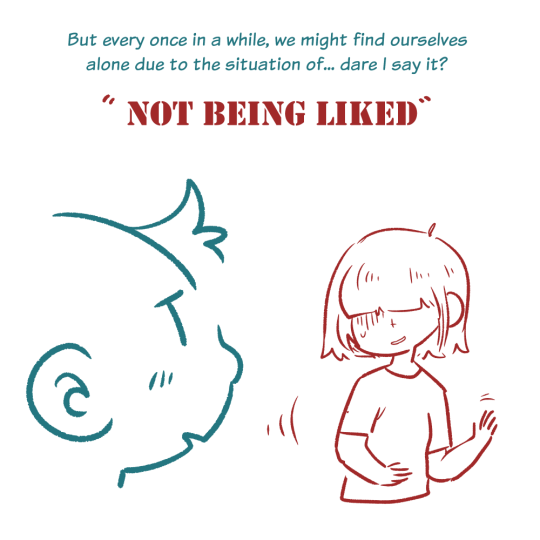
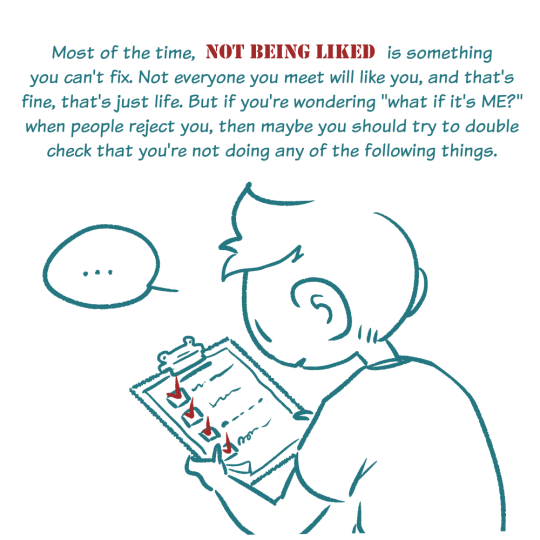
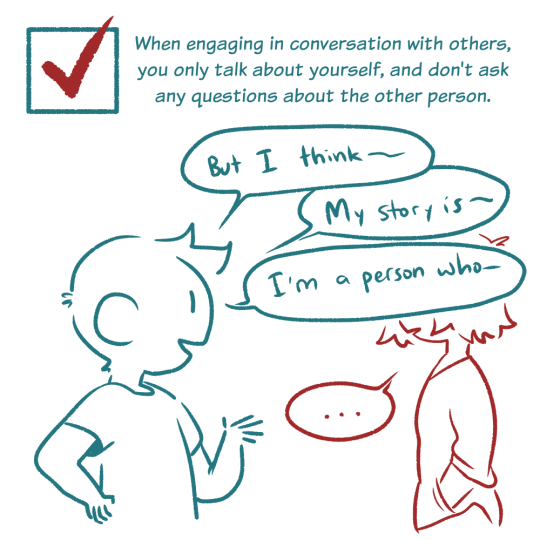

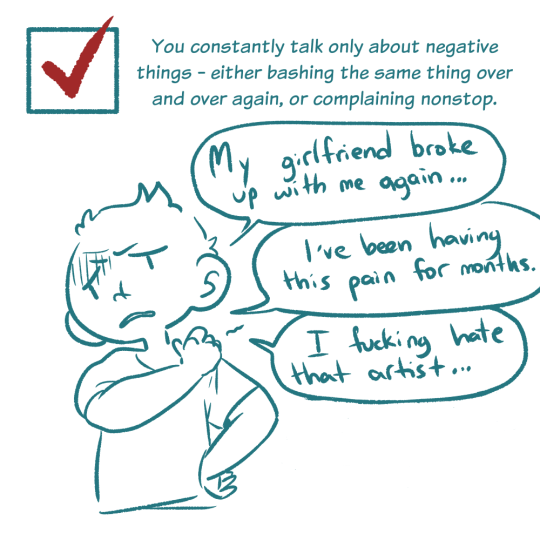



*this is especially important: these days on Tumblr there’s a wonderful atmosphere of being able to talk openly about your mental illness or your struggle. And that’s great! But there’s a difference between sharing in order to help yourself and other people and sharing just because you have no other coping mechanisms. As much as you’re able, try to work on developing a different outlet. People aren’t qualified to be your therapist because they’re nice to you a couple of times. Please remember that they have lives too, and their job is not to make you feel better or pity you, no matter how difficult your life is.
And last but not least:
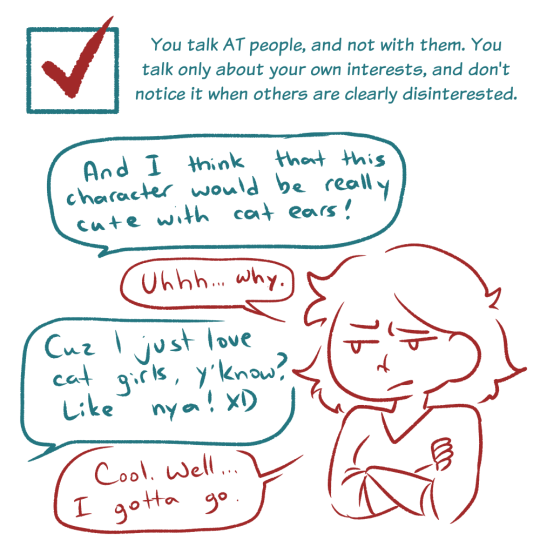
But…
I really don’t have a way to better this.
Your interests are your own. I can’t advise anyone to change their interests to fit in with a certain group of people - that’s stupid, and actually quite damaging to your sense of self.
Instead, I would recommend that, maybe if you feel like your topics of conversation are falling flat with this group of people, you move on to other, greener pastures. There are bound to be places where your ideas mesh better with an audience.
And of course - try to be considerate about what you say and how you say it.
Sometimes, what might seem like a harmless comment to you might be a very discomforting thought to another person. I recently had a conversation on a forum with a guy who was telling me that his headcanon was that Pearl (from SU) would soon get a male love interest who loved mechanics and weapons next, and that would be her best arc, because she would finally get a ‘healthy’ love interest.
His intentions were good, but he was entirely unaware of how cringey this kind of thing was to a bunch of (probably queer) people, who have spent their entire lives being told that the only ‘good’ character development for them would be to get a ‘male love interest’. No one wanted to be the jerk to say “fuck off, we don’t want that to happen” but everyone was answering him in a flat way, trying to discourage the discussion further. Instead of picking up on the hint, he bulldozed on, thinking he was having a ‘lively conversation’ which was, in fact, in its late stages of death.
I know I’ll probably get a few messages to this saying: What about people on the Autistic Spectrum? Sometimes, people can’t pick up social cues or ‘hints’. And if that’s the case, it’s incredibly difficult to understand why you’re not having any luck communicating despite your best efforts.
I feel that on a person level, please believe me. I made this infograph for THAT VERY REASON. Because I WAS that awkward kid who didn’t pick up on hints well. In fact, I still have trouble talking to people. If any of you have had the misfortune of being my conversational partner, you’ll know that I tend to be overly blunt and come off as very unfriendly. It’s something that I, myself, am working on currently in order to grow into a better person. It’s a struggle in progress, but I am aiming towards the progress side, and I just wanted to help out others while I was at it.
106K notes
·
View notes
Text
What to do if you suddenly find yourself homeless
FOOD
Find your nearest food bank or mission, for food
grocery stores with free samples, bakeries + stores with day-old bread
different fast food outlets have cheaper food and will generally let you hang out for a while.
some dollar stores carry food like cans of beans or fruit
SHELTER
Sleeping at beaches during the day is a good way to avoid suspicion and harassment
sleep with your bag strapped to you, so someone can’t steal it
Some churches offer short term residence
Find your nearest homeless shelter
Look for places that are open to the public
A large dumpster near a wall can often be moved so that flipping up the lids creates an angled shelter to stay dry
HYGIENE
A membership to the YMCA is usually only 10$, which has a shower, and sometimes laundry machines and lockers.
Public libraries have bathrooms you can use
Dollar stores carry low-end soaps and deodorant etc.
Wet wipes are all purpose and a life saver
Local beaches, go for a quick swim
Some truck stops have showers you can pay for
Staying clean is the best way to prevent disease, and potentially get a job to get back on your feet
Pack 7 pairs of socks/undies, 2 outfits, and one hooded rain jacket
OTHER
first aid kit
sunscreen
a travel alarm clock or watch
mylar emergency blanket
a backpack is a must
downgrade your cellphone to a pay as you go with top-up cards
sleeping bag
travel kit of toothbrush, hair brush/comb, mirror
swiss army knife
can opener
876K notes
·
View notes
Text
If you are currently sitting or laying down this moment ask yourself if you are resting or rotting. Change your behavior accordingly
66K notes
·
View notes
Text
By the way, you can improve your executive function. You can literally build it like a muscle.
Yes, even if you're neurodivergent. I don't have ADHD, but it is allegedly a thing with ADHD as well. And I am autistic, and after a bunch of nerve damage (severe enough that I was basically housebound for 6 months), I had to completely rebuild my ability to get my brain to Do Things from what felt like nearly scratch.
This is specifically from ADDitude magazine, so written specifically for ADHD (and while focused in large part on kids, also definitely includes adults and adult activities):
Here's a link on this for autism (though as an editor wow did that title need an editor lol):
Resources on this aren't great because they're mainly aimed at neurotypical therapists or parents of neurdivergent children. There's worksheets you can do that help a lot too or thought work you can do to sort of build the neuro-infrastructure for tasks.
But a lot of the stuff is just like. fun. Pulling from both the first article and my own experience:
Play games or video games where you have to make a lot of decisions. Literally go make a ton of picrews or do online dress-up dolls if you like. It helped me.
Art, especially forms of art that require patience, planning ahead, or in contrast improvisation
Listening to longform storytelling without visuals, e.g. just listening regularly to audiobooks or narrative podcasts, etc.
Meditation
Martial arts
Sports in general
Board games like chess or Catan (I actually found a big list of what board games are good for building what executive functioning skills here)
Woodworking
Cooking
If you're bad at time management play games or video games with a bunch of timers
Things can be easier. You might always have a disability around this (I certainly always will), but it can be easier. You do not have to be this stuck forever.
62K notes
·
View notes
Text
If you take the bus, wave to the driver and thank them as you're getting off the bus.
Being a bus driver is an underappreciated and difficult job but still very vital to society. They still have to do customer service and deal with rude and even aggressive passengers, and on top of that have to deal with traffic and other drivers all day (and let's face it, there's a lot of bad drivers out there who aren't considerate about sharing the road). All while providing an invaluable service of getting us where we need to go. Showing them some appreciation can go a long ways for someone doing such an important job that usually gets little to no recognition or thanks.
27K notes
·
View notes